With the rapid development of the mobile Internet and the massive release of medical and health needs by the public, smart medical care has grown unprecedentedly and the prospects are increasingly broad. It is estimated that by the end of this year, China's mobile medical market will exceed 10 billion yuan, reaching 12.53 billion yuan.
The development of intelligent medical care is mainly divided into three stages. At present, it has passed the first experimental stage and entered the second commercial stage. In the second phase, smart healthcare will usher in a period of rapid development and exhibit characteristics different from the previous phase.
At this stage, smart medical care will propose solutions to specific problems, and the service targets will be turned into patients and enterprises. At the same time, deep integration with traditional healthcare systems makes medical services more efficient.
Specifically, smart healthcare will present four main characteristics. First, big data assisted diagnosis and treatment. Collecting information and data through terminal devices to achieve multi-party interaction and sharing, so as to monitor medical conditions in real time, solve problems in time, and ultimately change the entire medical operation mode.

Second, to achieve a full range of patient perception. Through the relevant equipment, systems or processes, real-time sensing, measuring, capturing and transmitting patient information, taking relevant measures or planning according to this, making medical services more close to the people.
Third, comprehensive analysis of medical resources. The biggest feature of intelligent medical care is intelligence, which can provide in-depth analysis, aggregation and calculation based on data, and provide a basis for specific scenarios and solutions to specific problems. This premise is to obtain detailed, specific and comprehensive information resources.
Fourth, the terminal development of smart medical. The purpose of intelligent medical terminals is to break the time and space constraints and achieve continuous and accurate monitoring of disease information. However, it is far from enough to record or monitor only. In the future, smart medical terminals should be more intelligent and professional.
Vitamins are a type of trace organic substances that humans and animals must obtain from food in order to maintain normal physiological functions. In terms of physiological functions, vitamins are neither a raw material for tissues nor a substance for supplying energy, but they are an indispensable substance for the body. It has many types and different chemical structures. Most of them are the components of the coenzyme (or prosthetic group) of certain enzymes. They are the indispensable compounds for maintaining the normal growth (growth, health, reproduction and production function) of the body. It plays a catalytic role in the body to promote the synthesis and degradation of major nutrients (proteins, fats, carbohydrates, etc.), thereby controlling metabolism. Vitamins are essentially low-molecular organic compounds. They cannot be synthesized in the body, or the amount synthesized is difficult to meet the needs of the body, so they must be supplied from the outside. The daily requirement of vitamins is very small (usually measured in milligrams or micrograms). They are neither a raw material for body tissues nor a substance for energy supply in the body. However, they do not regulate material metabolism, promote growth and development, and maintain physiological functions.
Vitamin K2 MK-7, Vitamin C, Vitamin E, Vitamin K2, Vitamin H, Vitamin D3
Xi'an Gawen Biotechnology Co., Ltd , https://www.ahualynbio.com